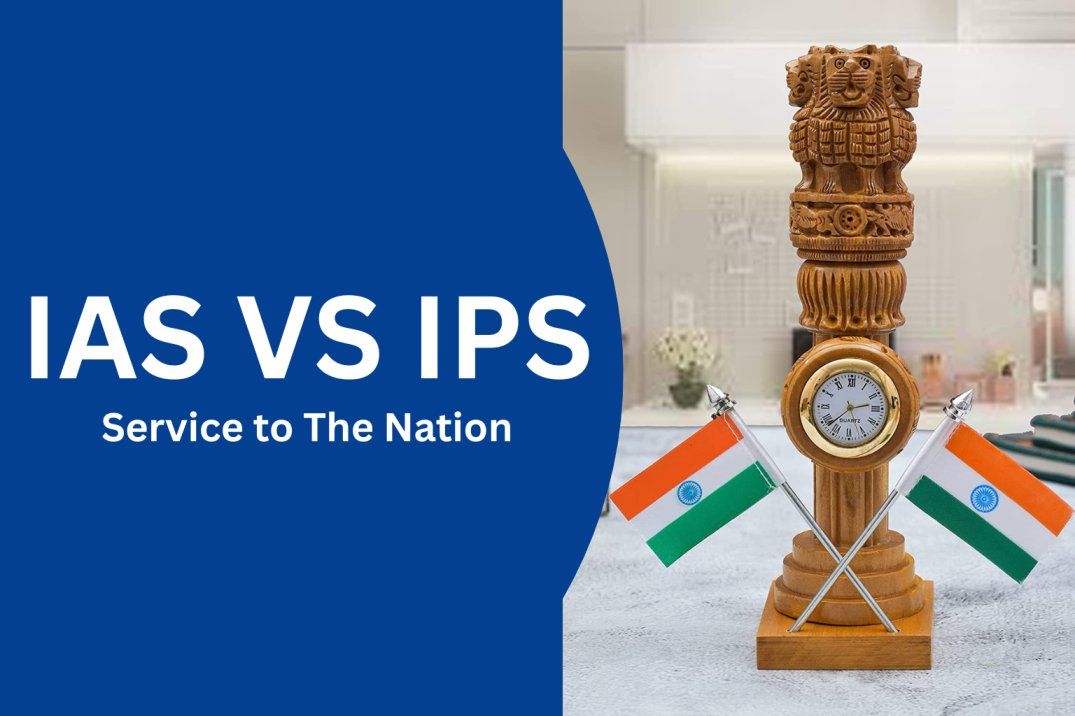Difference Between IAS and IPS: Rank, Salary Structure & Powers
Jul, 2025
•4 min read
Many UPSC aspirants ask — What is the difference between IAS and IPS? It’s not just you. This is one of the most common questions among beginners. Both are top civil services, and both are chosen through the same exam. But the roles, responsibilities, training, powers, and even lifestyle all differ in many ways.
While IAS officers usually work on policy making and administration, IPS officers are responsible for maintaining law and order. The IAS vs IPS choice is about the kind of impact you want to make.
Here, we’ll explain the difference between IAS and IPS. From rank and salary to duties and powers, you’ll get a clear understanding of both services to make an informed decision.
IAS vs IPS

The full forms of IAS and IPS are Indian Administrative Service and Indian Police Service, respectively. These are two of the most prestigious and powerful positions offered through the UPSC Civil Services Examination.
Naturally, one common debate among aspirants and even the general public is — Which is better, IAS or IPS? Or who holds more power? While both services hold immense importance in governance, they serve very different roles in the system.
Every year, nearly 10 lakh candidates apply for the UPSC CSE, with many aiming to secure a place in either of these two top services.
- IAS officers are primarily responsible for policy implementation, administration, and developmental work across various departments of government, both at the central and state levels.
- IPS officers, on the other hand, are tasked with maintaining law and order, managing police forces, and overseeing internal security and public safety.
Key Differences Between IAS and IPS
The table below provides a detailed view of how IAS and IPS differ in terms of responsibilities, powers, and career paths.
Now that we’ve seen how the roles of IAS and IPS differ, let’s understand how their career ranks progress over time.
IAS vs IPS: Rank Structure and Career Progression
There is a clear difference between IAS and IPS ranks. While both services offer growth through promotions, the designations and responsibilities at each level vary. Here’s a comparison of IAS and IPS officer ranks:
You might also like: What UPSC Wants from IAS Aspirants
This rank structure reflects the distinct paths both services offer, each with its challenges, responsibilities, and scope for leadership.
IAS & IPS Salary Comparison and Allowances
The salary structure of both IAS and IPS officers is determined by the 7th Pay Commission, and it is largely similar across services, especially in the early stages.
- The starting basic pay for both IAS and IPS officers is around ₹56,100 per month (Pay Level 10), excluding allowances.
- With promotions and years of service, the salary increases significantly.
- The highest salary for an IAS officer can go up to ₹2,50,000 per month (Cabinet Secretary). For an IPS officer, it can reach the same amount (DGP level in states or Director of IB/CBI).
Both services also receive additional allowances such as:
- Dearness Allowance (DA)
- House Rent Allowance (HRA)
- Travel Allowance (TA)
- Vehicle, domestic help, and accommodation (especially for field postings)
Though the pay scale is similar, perks may vary slightly depending on the post, state, and service conditions.
IAS vs IPS: Roles and Responsibilities
"With great power comes great responsibility."
This holds true for both IAS and IPS officers, who serve as the backbone of India’s administrative and law enforcement systems. While their goals may align, public service and national development, their day-to-day responsibilities differ greatly.
Roles and Responsibilities of an IAS Officer
IAS officers are involved in governance, policy-making, and administration at both the central and state levels. Their key responsibilities include:
- Implementing government policies and developmental programs
- Managing district and state-level administration
- Overseeing revenue collection and land records
- Coordinating between various departments and ministries
- Serving as District Magistrate/Collector during field postings
- Handling disaster management and crisis response
- Framing and advising on policies at the secretariat level
- Representing India at international forums or deputation abroad
Also read: Essential Strategy to Crack UPSC IAS Exam in First Attempt.
Roles and Responsibilities of an IPS Officer
IPS officers are primarily responsible for maintaining law and order and ensuring public safety. Their major responsibilities include:
- Leading police forces in a district, zone, or state
- Preventing and investigating crimes
- Managing traffic control and VIP security
- Maintaining internal security and handling riots or unrest
- Supervising intelligence gathering and criminal investigation units
- Leading central forces like CRPF, BSF, CBI, IB, etc., on deputation
- Training and managing police personnel
- Working on cybercrime, counterterrorism, narcotics, and more
Want to Become the Next IAS or IPS Officer?
Choosing between IAS and IPS is not just about status or salary. It’s about the kind of impact you wish to create. Do you see yourself shaping policies and driving development? Or do you dream of leading from the front, ensuring law and order on the ground?
SuperKalam is here! Your AI-powered personal mentor, offering tools and guidance tailored to every stage of UPSC preparation:
- Practice Unlimited MCQs and attempt tests
- Master PYQs with ease using our exclusive PYQ tool
- 24x7 Doubt Resolution for your queries anytime, anywhere
- Stay Updated on Current Affairs with our Daily News Summary
- Instant Mains Answer Evaluation with detailed Model answers
- Stay motivated with streaks and track progress with leaderboards
So, ask yourself: Where does your passion lie? Whatever you choose, remember that with the right preparation, dedication, and intent to serve, you can wear either badge with pride.
Join thousands of aspirants already on SuperKalam and make your UPSC dream a reality. Keep going!
You might also like: Success Stories of IAS Toppers Cleared with Self-Study


